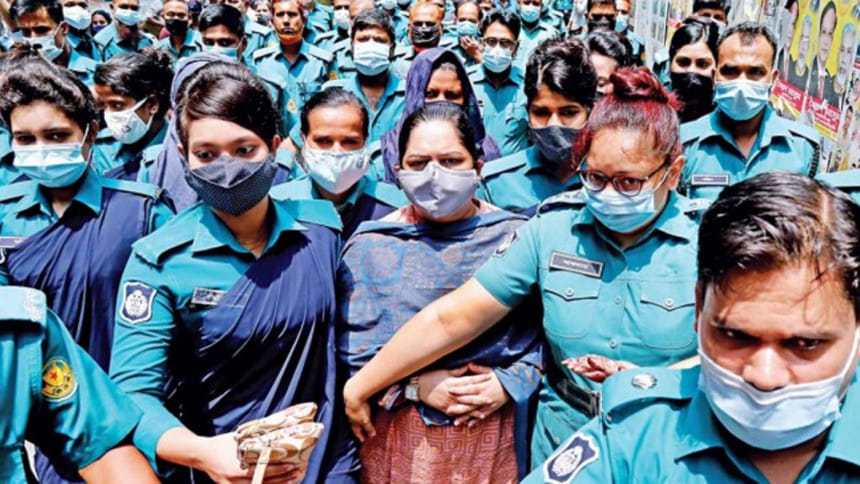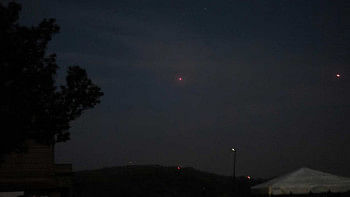The relationship between government employees and journalists

I felt distressed and embarrassed after coming across the news of senior journalist Rozina Islam's ordeal of harassment at the health ministry and her eventual arrest. From the very beginning of my stint in government offices, I have been meeting and greeting journalists on a continual basis. I have never seen such a hostile relationship among these parties before. How did it come down to this?
In 1979, at the very beginning of my career, I met some journalists for the first time, inside the Chattogram customs building. As per a court order, we raided the premises of some business organisations in Khatungonj for a case filed under the category of falsifying product announcement, arrested some people and seized some counterfeit seals and documents. Naturally, journalists crowded the place. We briefed them about the issue. Even then, they would often come to me on a one-to-one basis or as a team to ask different questions. I would let them know as much as I could. And also, I would refrain from discussing the more sensitive issues.
The journalists would reach out to their other sources and publish news accordingly. If the government's interests were hampered or if any false news was published, we would send them a rejoinder. They would always publish the rejoinder with utmost importance, and alongside, they would also publish a statement defending their own position. No matter what, our communications were never severed and our personal relationships were never affected. For this reason, I would also sometimes get important news from them in advance, which would be helpful towards public work. Then, when I got transferred to the Dhaka customs building in 1982, I started communicating with the journalists of Dhaka city. I could not concur with every piece of news they would publish, and even though some of them would embarrass me, I still thought they are doing their work and we are doing ours.
Once, a journalist asked me about a specific issue of interest and wanted to know whether it was true or not. When I informed him of my inability to discuss the matter, he showed me a photocopy of a document that was generated by my department. He also showed me photocopies of notes written by myself and my superiors. He even managed to show me a copy of a document from the president's office. I asked him how and where he found these documents. He smiled and replied that they have their own sources for obtaining such information. I said, isn't it wrongful conduct? He replied, what can we do? Despite this being a public interest issue, you will not let us know the details, so we had to resort to this method. Notably, the Right to Information Act had not been enacted then. However, I did not call the journalist names, nor did I call in guards from outside to harass him. Instead, I took measures to prevent the photocopying of sensitive documents in future. This, the so-called "information theft" of journalists, is not a new phenomenon. In fact, smartphones have eased the act of taking photos to a greater extent.
I started working for the National Board of Revenue (NBR) after returning from studying abroad. During this period, my relationship with journalists became much more intimate. Three issues under my radar interested them greatly. Firstly, the ongoing discussions with the World Bank and the IMF regarding the restructuring of revenue collection activities; secondly, the changed rates of duties and excise taxes (later on, value added tax) in the upcoming budget; and thirdly, the negotiations regarding SAPTA and SAFTA agreements, etc. As my experience grew, I also became more proficient in dealing with journalists. I have no hesitation in admitting that just like flying trial balloons, I used to gather some ideas on public opinion by giving the journalists a heads-up regarding upcoming changes in policies. I also aided in publishing news that would facilitate the discussions with the World Bank and the IMF.
I also took the help of journalists in combatting decisions taken by selfish politicians that went against public interest. I can proudly state that I have acted as the anonymous source for many headline news items. A lot of the time, I would get the nod from my superiors before conducting such activities. On certain occasions, I would do them deliberately. On those occasions, the secretary would single me out to ask how that particular news ended up in the newspaper. However, on most occasions, news like those would only help serve the public interest; not our personal interest, and during certain times, news from "anonymous sources" would also help us in taking decisions!
As we developed a good personal rapport during my stint at the NBR, journalist Shakil Anwar (currently working at BBC) publicised the news of the economic re-evaluation of the Jamuna Bridge project and bringing back the World Bank as its financer under the banner of UNB, and many other news outlets published it as their headline news item.
Afterwards, when I joined IDCOL, there were not many public interest stories there, but still, due to our personal relationship, some journalists would visit, and we would indulge in casual chitchat. They would always give good coverage to our different events. Over the course of time, a few journalists even became my personal friends!
Even at my latest area of work, the Power Division, I continued to have deep and regular communications with the journalists. Some of them criticised our work and published news items accordingly. If the claims were baseless, I invited the relevant journalist to discuss and I tried to explain the reality. I accepted their constructive criticisms. I put in efforts to remedy the situation because, as government employees, none of us are above accountability. Additionally, who can wholeheartedly claim that all of their decisions were correct?
Sagar-Runi and Rozina Islam were among the journalists that used to regularly visit the Power Division. Back then, Rozina was working in Dainik Sangbad. None of them seemed unprofessional. I informed them as much as I could. I refrained from discussing matters that could not be revealed. They did their work, and we did ours. None of us became a source of mental stress for the other, and we never expressed any malicious intentions towards each other. Instead, we maintained a mutual sense of respect among ourselves.
So why did this happen now? I assume, the relationship between the two parties have deteriorated. In our times, student leaders would attain government jobs according to their own merit. However, when they joined the government job, they did not continue assuming their former student organisation's identity. I am observing that nowadays, people keep on assuming their student organisation's identity even after joining a government job. For this reason, they fail to maintain an air of neutrality in their place of occupation.
Surely, even during those times, the politicians had family ties and other kinds of personal relations with government employees. We all knew that an officer of the Chattogram customs building was a close relative of the then president. However, this information would never be revealed from his dealings, and he never took any advantage of this identity. But nowadays, position, placement and promotion—all are dependent on relationships like these. These officers are no longer acting like officers. They are behaving like party cadres.
Even the journalists are not confining themselves to journalism. Flattery, blackmailing, politics and business—a lot of journalists are being labelled by these attributes. Thus, journalists in general are losing respect. If such failings did not exist, a professional government officer and a professional journalist would never indulge in such enmity.
What can be done? Secrecy is the biggest enemy of proper governance and it is also the cornerstone of corruption. Thus, the amount of secrecy at public offices should be brought down to a minimum. Effective implementation of the Right to Information Act should be carried out immediately. Any information sought in public interest should be delivered with precision and pace. The rehabilitation of people using party cadre identities in government jobs should be ceased.
Newspapers and news outlets that only exist in name and do not have an established reader and viewer base should lose their Declarations. The National Press Council and the journalists may prepare a code of conduct for people who are engaged in their profession. The journalists should pick a single option from either journalism, flattery, politics or business. Otherwise, the downfall that has started cannot be stopped, and the situation will become much grimmer in the future.
Dr M Fouzul Kabir Khan is a former Secretary and economist. Email: [email protected]. This article was originally published in Prothom Alo on May 24 and has been translated from Bangla by Mohammed Ishtiaque Khan.

 For all latest news, follow The Daily Star's Google News channel.
For all latest news, follow The Daily Star's Google News channel. 



Comments